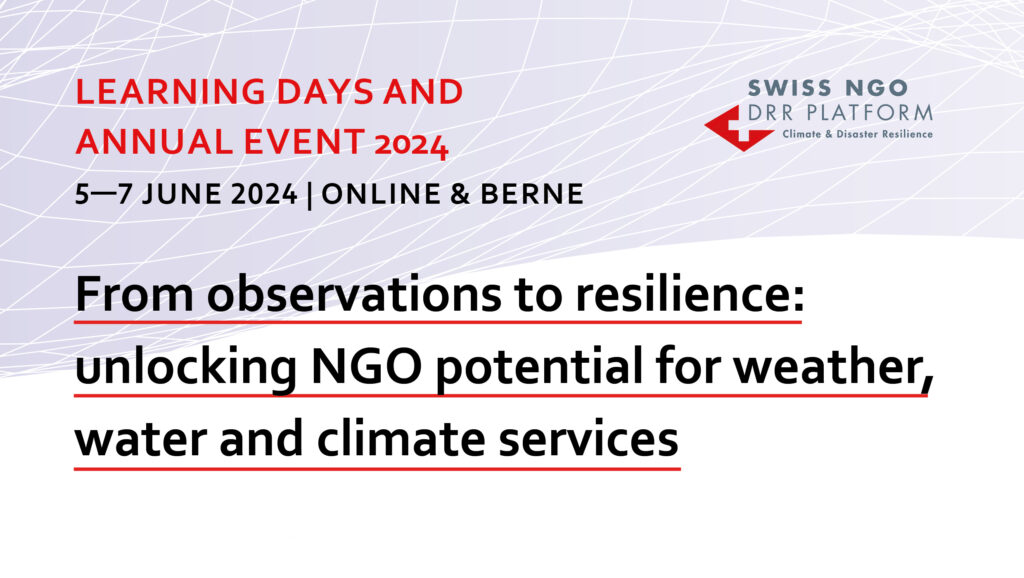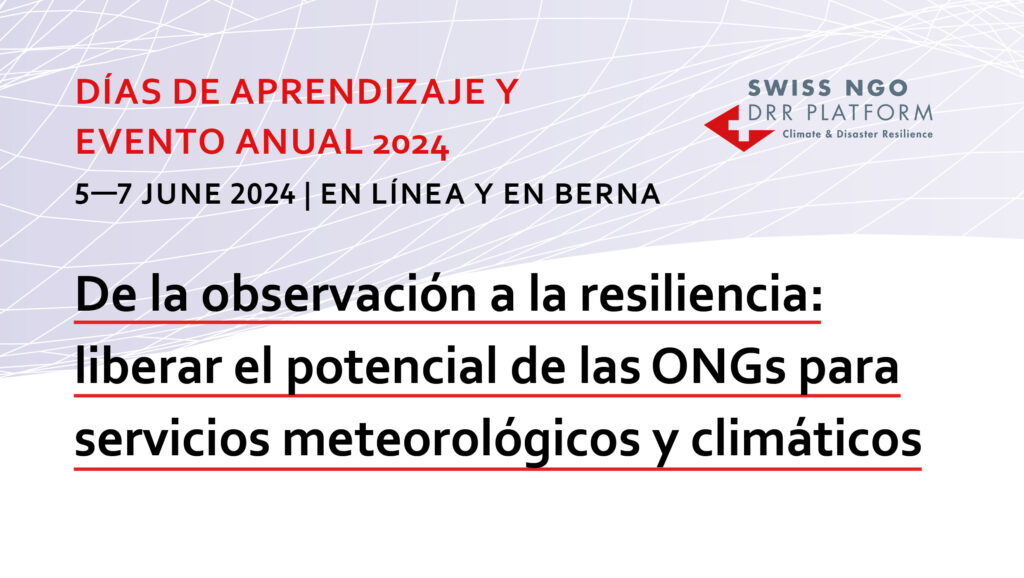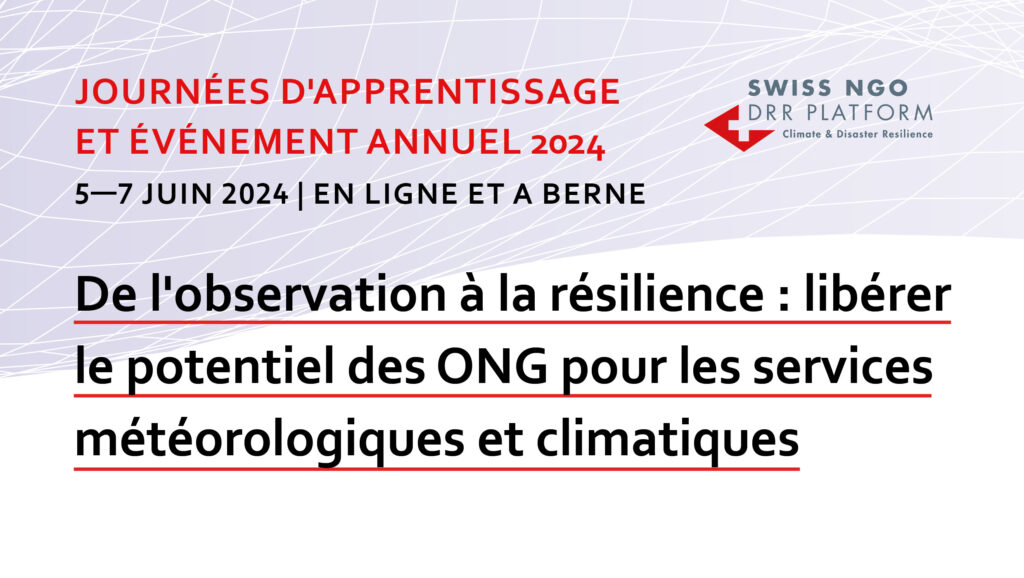Learning Days and Annual Event 2024
From observations to resilience: unlocking NGO potential for weather, water and climate services



Weather, water and climate services (WWCS) play a crucial role in climate adaptation and disaster risk reduction. To be effective, they require the collaboration of multiple stakeholders with wide-ranging expertise and skills to manage complex processes. For people in remote, neglected, and vulnerable areas, accessing accurate and reliable information through WWCS can be very difficult. NGO often step in to address this gap. They work to connect the services available at the national level with the local communities and stakeholders who may otherwise struggle to access these vital information and services.
Are you
- implementing projects and programmes related to climate change and disaster risk reduction?
- interested in learning and exchanging on the importance of WWCS for climate and disaster resilience?
- curious about roles and contributions of NGO to ensure that WWCS are relevant for everybody?
Then these learning days and that annual event are for you!
Join us to share and learn from existing experience of platform member organizations and their partners, as well as other organizations and stakeholders involved in providing, using and, assessing WWCS in the context of international cooperation.
In 10 online thematic sessions we will explore several core areas of well-functioning weather, water and climate services, including:
- Understanding the fundamentals
- Project experiences from various contexts
- Early warning systems and anticipatory action
- Agrometeorological information services
- Frameworks and cooperations from the global to national level
- Climate projections and local scenarios
- Private sector engagement in WWCS
- Evidence based on research and evaluations
Objectives
With the learning days and the annual event, our aim is to bring together NGO practitioners and all interested professionals involved in providing, using and assessing WWCS, promote exchange and learning on the topic and discuss good practices and opportunities in using and implementing WWCS.
Thematic sessions
Several thematic sessions aim to answer frequently asked questions and encourage reflection on challenges and opportunities that NGO may face when working in the field of WWCS. Although mainly addressing NGO practitioners, these sessions are open to all interested parties and will combine experiences from different stakeholders to paint a comprehensive picture and strengthen capacities towards successful implementation.
All thematic sessions will take place online, and most will have simultaneous translation into English, French and Spanish. You can participate in all or select sessions of your interest, but we encourage you to start with the introductory session “Unpacking WWCS – Understanding the fundamentals”.
All sessions will be recorded and uploaded on our Youtube channel.
Annual event
To conclude the learning days, the annual event of the Swiss NGO DRR Platform will reflect on the findings from the thematic sessions and bring together a broad audience in-person in Bern. Speakers from governments, multilateral organizations, philanthropy, academia and civil society will discuss the way forward.
The annual event will be held in Bern, Switzerland, in English. It will be live-streamed in English and simultaneously translated to French and Spanish.
Detailed Programme
1: INTRODUCTORY SESSION: Unpacking WWCS: Understanding the fundamentals.
Wed, 5 June 9:00 – 10:30 CEST / online / Languages: English, translated to French
Wed, 5 June 16:30 – 18:00 CEST / online / Languages: Spanish
Organized by Christina Aebischer (Helvetas) and Johanna Zwahlen (Zoï Environment Network)
WWCS follow a value cycle where understanding the interdependencies between the activities and the involved stakeholders are crucial. To be effective, WWCS service providers and users must work together and strengthen each other along the WWCS value cycle. After an overview of the platform’s learning journey, this introductory session aims to create a common understanding of fundamental concepts and terminology of WWCS. We will also reflect broadly on the roles of NGO and discuss potential areas where NGO involvement have the greatest impact.
Speakers:
- Johanna Zwahlen, Zoï Environment Network
Importance of WWCS for the DRR Platform and for DRR and climate change adaptation - Omar Bellprat, Bellprat Climate Consulting
WWCS fundamentals and value cycle - Christina Aebischer, Helvetas
The possible roles of NGO in strengthening effective WWCS
2: THEMATIC SESSION: Saving lives and reducing losses – How Early Warning Systems and Anticipatory Action make a difference
Wed, 5 June 11:00 – 12:30 CEST / online / Languages: English, translated to French and Spanish
Organized by Jana Jungardt (Helvetas) and Arabela Philipona (HEKS)
Knowing what’s coming and taking action before a disaster strikes – these are the major principles of both early warning systems and anticipatory action. Both approaches have gained considerable traction over the past years, partly linked to increased needs, the better availability of high quality forecasts and their ability to save lives and reduce losses. Pre-allocated funding mechanisms ensure timely and proactive responses to emerging crises, but also come with the complexity of defining triggers and action protocols. The session aims to enhance understanding of the approaches, and shed light on good practices, challenges and the particular role of NGO in this field.
- Watch the session in English / Français / Español
- Download the PPT slides
Speakers:
- Ramesh Tripathi, WMO
- Aaron Bouchane, People in need Cambodia
- Shivangi Chavda, GNDR
3: THEMATIC SESSION: The platform experience capitalization: achievement and challenges from five projects around the world.
Wed, 5 June 14:30 – 16:00 CEST / online / Languages: English, French, Spanish, translated to each language
Organized by Maria Claudelin (Caritas Switzerland) and Sonja Tschirren (Swissaid)
From early warning systems to agroecological information to farmers and to climate projections use in local cooperation projects, the five experiences of DRR Platform member organizations have been capitalized and discussed intensively during the prior internal learning process. In this session, the five projects take the floor publically to present themselves, and their achievements and challenges so far. Project representatives discuss about the quality and usability of their current weather services offering, including their plans to guarantee the economic and social sustainability of the services. The session focuses on the role of NGOs in the WWCS provision and showcases the diversity, but also overlaps and synergies.
- Watch the session in English
- Download the PPT slides English Spanish group / French group
Speakers:
- Rosaline Dacko, Helvetas
Case study Mali - Patricia Gomez, Medair
Case study Madagascar - Allan Barahona, Fundación Parque Nacional Pico Bonito (FUPNAPIB) (tbc)
Case study Honduras, Guatemala, Nicaragua - Sonja Tschirren, Swissaid
Case study Nicaragua - TBC
Case study Tajikistan
4: THEMATIC SESSION: Agrometeorological information services: Improving farmers’ adaptation to climate change
Thu, 6 June 08:00 – 09:30 CEST / online / Languages: English, translated to French and Spanish
Organized by Maria Claudelin, Boris Orlowski (Caritas Switzerland) and Sonja Tschirren (Swissaid)
What is needed to establish well-functioning agrometeorological information services to farmers in remote communities? What service has to be delivered by whom in the value chain? This session dives into discussions about production and distribution of reliable local weather forecasts and practical farming recommendations, with the goal of improving agricultural productivity and resilience of smallholder farmers. Through examples of different projects, we cover different types of data and ways of delivery, as well as of financing the services, while not forgetting about real-life evidence of the usefulness of agrometeorological information.
- Watch the session in English
- Download the PPT slides
Speakers:
- Boris Orlowski, Caritas Switzerland
Insights in experiences in Tajikistan - Sonja Tschirren, Swissaid
Insights in experiences in Ecudor & Colombia
5: THEMATIC SESSIONS: Good practices and impact of WWCS: Evidence from research and evaluations
Thu, 6 June 10:00 – 11:30 CEST / online / Languages: English, translated to French
Thu, 6 June 15:00 – 16:30 CEST / online / English, translated to Spanish
Organized by Ernst Schaltegger (Innovabridge)
The results of applied research and evaluations provide valuable orientation for implementation practice and are essential for continuous quality improvement. What do researchers and evaluators tell us about the impact of WWCS, about the conditions that are necessary for efficiency and effectiveness to unfold, and about the approaches to really reach out to users that are most in need of that information? In these two sessions, the results of research and evaluations from different researchers will broaden our perspective. In order to do justice to the range of experiences and the differences in different continents, two sessions will be held in different time zones and languages.
- Watch the first session in English / Watch the second session in English
- Download the PPT slides
Speakers:
- Mani Nepal, International Center for Integrated Mountain Development ICIMOD
Impact of weather and climate advisories on agricultural outcomes in Pakistan - Emmanuel M.N.A.N. Attoh, International Water Management Institute
Making Climate Services Actionable for Farmers in Ghana: The Value of Co-Production and Knowledge Integration, Indigenous Knowledge and Climate Governance
6: THEMATIC SESSIONS: From global to national: Cooperation and frameworks for WWCS
Thu, 6 June 13:00 – 14:30 CEST / online / Languages: English, translated to French and Spanish
Organized by Christina Aebischer (Helvetas) and Johanna Zwahlen (Zoï Environment Network)
The Paris Agreement calls for effective climate change adaptation measures in the Global South which in manifold aspects involve the further development of WWCS. This international commitment leveraged various programs for strengthening WWCS globally such as the Climate Risk Early Warning Systems (CREWS), Systematic Observations Financing Facility (SOFF) or the Early Warning for All initiative under the umbrella of the World Meteorological Organisation WMO. It actively collaborates with National Meteorological and Hydrological Services worldwide, and follows the paradigm that critical WWCS should be a public service under a regulatory framework. Strengthening the capacities of national services is hence of vital importance, and NGO can play a crucial role. Entry points for contribution and successful joint cooperation will be at the heart of this session’s discussion.
- Watch the session in English
- Download the PPT slides
Speakers:
- Ilaria Gallo, WMO
The role of WMO and national hydromet agencies in early warning and climate services - Andrea Rossa, MeteoSwiss
Developing partnerships and enhancing capacities of national hydromet services in the Andes: Experiences from project ENANDES+ - Grover Mamani and Orlando Chura, Helvetas Bolivia
Strengthening inter-institutional governance mechanisms: Experiences from Peru and Bolivia
7: THEMATIC SESSIONS: Climate projections and local climate scenarios: From data & tools to adaptation strategies
Fri, 7 June 09:00 – 10:30 CEST / online / Languages: English, translated to French and Spanish
Organized by Joachim Jung (Vivamos Mejor)
Suitable adaptation strategies need to be based on appropriate climate scenarios. However, for many regions in the global South, the current scenarios are not specific to a local level. How can we downscale existing regional climate scenarios to specific local scenarios to tailor local adaptation strategies? Which current tools for climate scenarios are available? We discuss the issue of downscaling of climate scenarios and the development of tailor-made adaptation measures based on an example from Guatemala and Honduras of monitoring of agricultural crops and biodiversity regarding climate change. The session concludes linking to the development of national adaptation strategies and the strengthening of national actors for climate adaptation.
- Watch the session in English
- Download the PPT slides
Speakers:
- Dr. Fabio Cresto Aleina, SEEK Development
Downscaling of climate scenario and local adaptation strategies - Omar Bellprat, Bellprat Climate Consulting
Global Framework for Climate Services (GFCS): systemic strengthening of national actors for climate change adaptation
8: THEMATIC SESSION: Private sector engagement in WWCS: Potential and challenges
Fri, 7 June 11:00 – 12:30 CEST / online / Languages: English, translated to French and Spanish
Organized by Organized by Christina Aebischer (Helvetas) and Johanna Zwahlen (Zoï Environment Network)
WWCS enable better decision making across a range of private sectors and thus create monetary value. However, there are various barriers (donor, regulatory, economic) that inhibit commercialization pathways and WWCS development projects often fail to sustain the gains through a sustainable business model. At the same time digitalization in the Global South in combination with artificial intelligence enables large opportunities for global providers to deliver first generation services. What role can NGOs take on the ground to overcome local barriers and co-create second generation services with local actors? What role will the private sector play in the future in this rapid evolving landscape? How can this development ensure adaptation justice that leaves no one behind?
- Download the PPT slides
Speakers:
- Annick Vollmer
Market system strengthening and private sector engagement: lessons learned from a NGO perspective - Ashish Raval, HMEI and Synoptic data
Global experiences of WWCS public private partnerships - Christoph Ramshorn, meteoblue
Private sector perspectives on global cooperation in hydromet services - Boris Orlowsky, Caritas Switzerland
WWCS in Tajikistan: Direct and indirect avenues of commercial value creation
ANNUAL EVENT: The future of WWCS – trends and perspectives to reach access for all
Welle 7, Bern Switzerland and online
Fri, 7 June 13:30 – 17:00 CEST, followed by an apéro riche / Languages: on-site in English, online in English and translated to
French and Spanish
Moderated by Ilona Paganoni
Organized by the WWCS Working Group
Swiss NGO DRR Platform’s annual event 2024 aims at summarizing findings of the learning days and conclude in a panel discussion with invited guests from governments, multilateral organizations, academia, private sector and the NGO platform.
Panelists:
- Daniel Kull
Director at the World Meteorological Organisation (WMO), Responsible for Development Partnerships, Resource Mobilization and Project Management - David Rogers
Senior Hydrometeorological Advisor at the World Bank and Consultant - Christoph Ramshorn
Chief Operations Officer at meteoblue AG - Sergio Perez
Program Officer – Climate, DRR and Environment Section – Swiss Agency for Development and Cooperation SDC - Mark Liniger
Head of Service and Development, Member of the Management Board of the Federal Office for Meteorology and Climatology MeteoSwiss - Bernita Doornbos
Head of Water Food Climate Team at Helvetas, member of the Steering Committee of the Swiss NGO DRR Platform
On-site participants: registration and door open at 13:00
Contact
In case of questions, please contact the Co-Leads of the WWCS working group:
Christina Aebischer (Helvetas)
Johanna Zwahlen (Zoï Environment Network)
Who we are
A working group on weather, water and climate services of the Swiss NGO DRR Platform has been operating since 2020, with the aim of guiding the platform’s learning journey to enhance understanding and improve practice of member organisations in WWCS. Its work culminates in the learning days and the annual event 2024.
Registration
Please register for each thematic session and the annual event here.
You will receive the zoom-link for participation upon registration via e-mail.
Participation is free of charge.
Online participation is unrestricted. Places for on-sitep articipation at the annual event on Friday afternoon in Bern are limited. Please only sign up for on-site participation if you can be present.

















